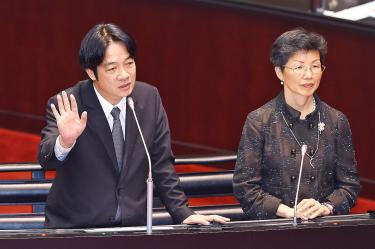The issue with the so-called “1992 consensus” is that there is no consensus about whether it exists or what it actually means, Premier William Lai yesterday told legislators yesterday, adding that the nation needs to address the problem.
Lai made the remarks at a plenary legislative session in response to Chinese Nationalist Party (KMT) Legislator Legislator Yosi Takun’s (孔文吉) demand that he and President Tsai Ing-wen (蔡英文) acknowledge the “1992 consensus.”
Citing Chinese Premier Xi Jinping’s (習近平) report to the Chinese Communist Party’s (CCP) 19th National Congress, Yosi Takun said that Tsai and Lai should accept the “historical fact of the 1992 consensus” and resume dialogue with Beijing.
“We are willing to have exchanges with any Taiwanese party, group or individual who… acknowledges the 1992 consensus and believes both the Mainland and Taiwan belongs to ‘one China,’” Xi told the congress on Wednesday.
Lai said Taiwanese society is divided on the “1992 consensus” framework.
“Some think the government should accept the ‘1992 consensus,’ while others believe there is no consensus. Even those who believe that it exists do not believe in China’s version,’” Lai said.
“There are two interpretations of one 1992 consensus,” Lai said, adding that China understands its “1992 consensus” to mean its “one China” ideology, while KMT Chairman Wu Den-yih (吳敦義) believes the framework means that each side can have its own interpretation of what “China” means.
“We need to take this problem seriously,” Lai added.
He said that Taiwan is a sovereign and independent country and that the Executive Yuan would continue to abide by Tsai’s cross-strait directive that the government would not change its goodwill or its promise of maintaining the “status quo,” nor would it compromise under pressure.
The Executive Yuan remains unwavering in its commitment to protect national sovereignty, as well as the nation’s free and democratic way of life, to develop the country’s economy and to strengthen the nation, he said.
“A tacit understanding should not be clarified in the open,” Yosi Takun said, to which Lai said that people need to deal with the issue candidly, as it could have severe ramifications for the future of the country.
Mainland Affairs Council (MAC) Minister Katharine Chang (張小月) said that Xi’s statement was a “carrot-and-stick ploy,” but that the government’s stance is to adhere to the values of freedom and democracy, while demonstrating sincerity and goodwill to the other side.
The “1992 consensus,” a term former MAC chairman Su Chi (蘇起) in 2006 admitted to making up in 2000, refers to a tacit understanding between the KMT and the CCP that both sides of the Taiwan Strait acknowledge there is “one China,” with each side having its own interpretation of what “China” means.
Source: Taipei Times - 2017/10/21





















